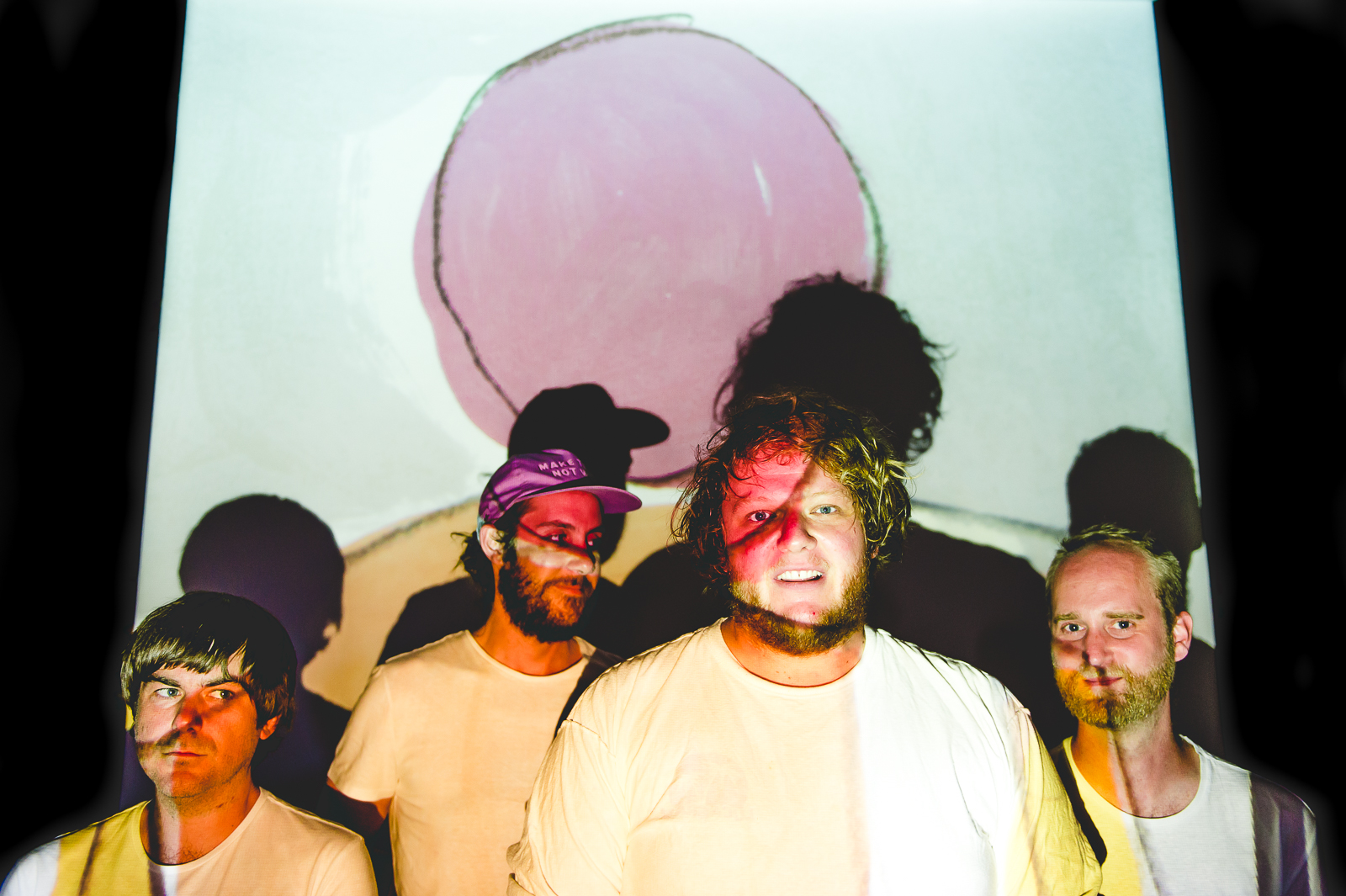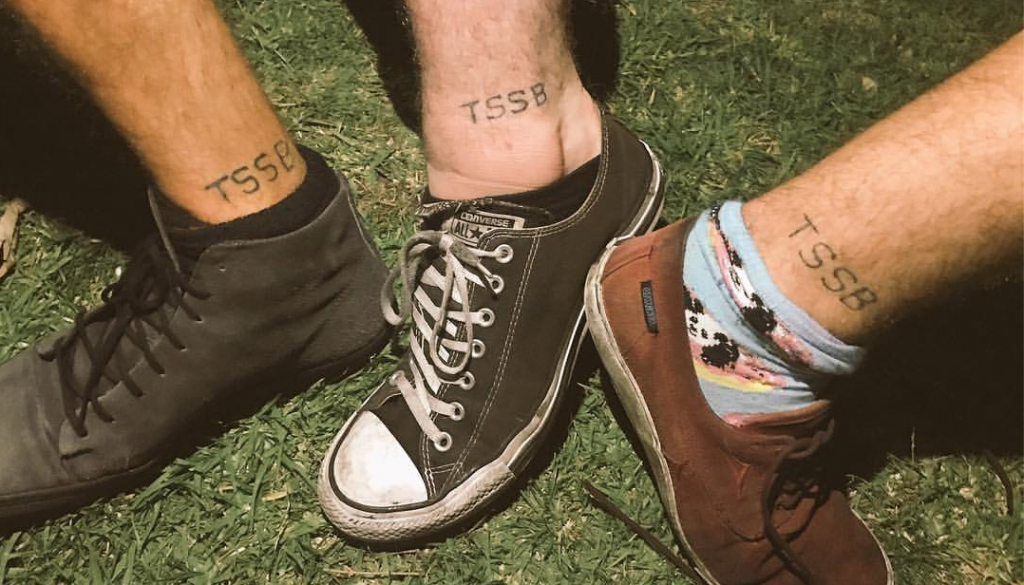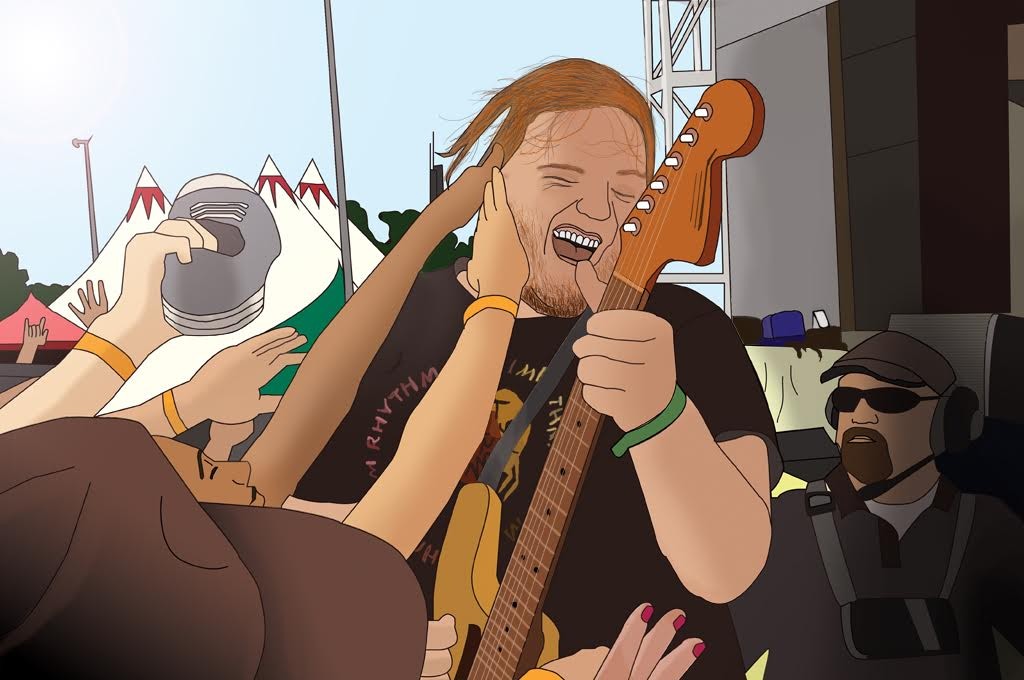“I Feel Disconnected From Melbourne Now”: A Candid Chat With The Smith Street Band
We talk mental health, scalpers and safe shows with Wil Wagner.

“I still feel like we’ve just tricked all these people into thinking that we deserve to play The Forum,” says The Smith Street Band’s Wil Wagner, ruminating on the sheer scale of the venues the band is playing on their upcoming album tour.
It’s a huge feat, but Wagner is confident that it’s the right step: “It really does feel like the last six or seven years have been building up to this album and this tour, so as much as it is daunting, I feel like we’re ready.”
Sitting in a cramped rehearsal room at Melbourne’s Laneway Studios, Wagner speaks confidently and freely. He’ll often talk quietly for extended periods before breaking into a booming laugh, emotion always present on his face and in his body language – a trait that makes him a compelling frontman and an excellent conversationalist.
We caught up to discuss Smith Street’s fourth album, More Scared Of You Than You Are Of Me, their monumental tour, and the struggles attached to being one of Australia’s most loved punk bands.
You guys are absolutely massive now, and you’re playing huge huge shows, but there are some caveats to that — namely, tickets are getting scalped at crazy prices and on your last tour there was some violence in some of the crowds. How do you deal with stuff like that?
We just take these issues as they come. These aren’t things we’ve had training for. The crowd stuff, we’ve been dealing with forever. I think I’ve dealt with it really badly in the past, where I’ve gotten super angry and I’ve been overly judgemental of people – I basically used to come out thinking like ‘Right, who’s gonna fuck with this’, which is a really negative way to look at shows.
So now all I do onstage is talk about love and positivity and the feeling of togetherness that we all have from being at this show, and how we’re all fucking losers together. I really just try and make it so even if you were the kind of person to do something really shitty, that wouldn’t cross your mind at one of our shows. I feel like even though there are things that happen at our shows, the overwhelming feeling is one of community and togetherness, and we have amazingly receptive and beautiful crowds.
I’d never wanna say like, ‘Every show we play someone’s gonna fuck up’. It’s one in fifty shows where something bad happens. We’ve played thousands of shows and had a handful [where that happens].
“The scalping thing’s just fucking crazy”
The scalping thing’s just fucking crazy. I just saw it, and did one tweet about it, and then like 15 minutes later I was being interviewed about it on triple j. I was like ‘I’m a little out of my depth on this topic’.
The more I’ve read up on it and the more I’ve spoken to people about it, I’ve realised it’s a fucking huge problem. When you become a bigger band, people will try and overprice your tickets. I made this huge complaint and Ticketmaster responded by saying that we should match the prices of the scalpers, which is just… what a piss weak response! That’s what you’re gonna say? Also they said they’ve invested eight billion dollars in technology but were unable to take down the 40 tickets off their website that were resale tickets. It’s like, fuck you.
I’m always about trying to protect people that come to our shows. With scalping, with crowd violence, with any of those things, it’s like, I don’t want people who come and see us to get hurt or get ripped off. I’ll always fucking stand up for them.
With this huge success, how have you found it becoming people of influence for a lot of young people?
It’s something that I think about a lot, and something that weighs on me. But y’know, I’m going to fuck stuff up. I’m going to say the wrong thing in situations, I’m going to give bad advice to people, [but] I can’t let that stop me from doing it.
“I remember seeing bands when I was sixteen, and I still remember word-for-word the one sentence the singer said to me”
I’d much rather get it right 90 per cent of the time than be a band that never responds to anything and just doesn’t give a fuck. If I fuck it up I’ll admit that I fucked it up. I think that that is an important thing that nobody in society ever fucking does anymore, because it’s too scary to admit that you don’t know something, or that you’re wrong.
We play a lot of all ages shows, we’re doing some in-stores and signings and stuff, and I do talk to lots of young people. It’s daunting, but I remember seeing bands when I was sixteen and I still remember, word-for-word, the one sentence the singer said to me. If I can have even one tiny bit of influence on these peoples’ lives, that’s insane.
That’s hugely meaningful, and that’s equally crazy as playing The Enmore to me – that there are kids out there who remember things I’ve said to them when they’ve come up on the street and asked for as selfie.

Photo via The Smith Street Band Facebook page
You’ve been very open about your mental health in your songs and in interviews. Does that ever scare you?
It doesn’t, and I don’t know why. I find everything else in the world scary, but for some reason talking about this very personal thing isn’t. To be honest, I do sometimes wish I could take it all back, and sometimes I’ve said things in interviews I later wished I hadn’t.
But the amount of people who come up and say ‘Hey, I have this, I have that, I heard you talk about it and I listened to Smith Street and I felt better’, I owe it to those people. Those are the people that paid for this rehearsal room, that paid for the clothes that I’m wearing, and my rent, and the phone in my pocket, and those are the people who support me not only financially but as a human being. And I understand what it’s like for them to have a band that they relate to. I have those bands too.
If it’s tough for me, the fact that I can help people who are going through similar stuff makes all that hardness on my part go away. We’ve had people come up and say that they’ve been through every possible horrible experience, things I could never even imagine, who have said ‘Your music helped me through this’. The fact that we can be there in any way for people who have gone through this stuff makes all of my awkwardness talking about it go out the window.
Is there one location that had a particularly large influence on this new album?
Probably New York. There’s a song specifically about a night in New York. I’ve spent a lot of time there and basically all I do is smoke pot and walk around with my headphones on just being like ‘Woah, look at that! Look at that!’ and just constantly writing.
I’m sure no one’s ever said this, but New York’s a very inspiring place. It’s almost like the sixth member of the band! Yeah, I’m tapping into something that a million people have tapped into before, but I find it to be very inspiring.
“I do kinda feel disconnected from Melbourne now…I feel like I’m not part of the scene like I used to be”
Obviously Melbourne is still a huge part of my life, but I do kinda feel disconnected from Melbourne now. When I’m here I’m either in recluse mode on a tour or I’m [at the rehearsal studio] every day, working. I can’t think of the last time I went to a show that I didn’t play at. I feel like I’m not part of the scene like I used to be, which is sad, but I also feel like I’m part of a bigger scene with people from all around the world, and that really inspires me.
Maybe I don’t have that sense of community here, but I have this crazy sense of global community that really inspires me. I think that’s probably as inspirational to me as any specific place.

Illustration by @mattjdesigns
Would you ever move from Melbourne?
Yeah, I’ve always wanted to. No offence to Melbourne, but I think it’s kinda important to not live in the city you were born in for your whole life.
But yeah, I’d love to — and I think I still will one day — I’ll set up shop in New York for a year or two and live there. But life’s busy. Maybe if we hadn’t just started a label I’d do it. But maybe the label will get big enough that I can go run the US division of Pool House Records.
After a long time with Poison City, you’ve started your own label, Pool House. Why the move?
It’s something that we’ve always spoken about, to be honest. We’re quite a DIY band, we tend to do everything ourselves, we’re control freaks, and we’re very particular. It’s something we’ve spoken about a lot, and then about halfway through making this record we all just kinda felt this real sense of pride and a real sense of ownership over it.
There was not a single hard feeling with Poison City, I still admire and completely love [Poison City owner] Andy, he’s a fantastic human being, and we still have a lot to do with them. But the time was right, y’know?
We asked Courtney Barnett, we asked King Gizzard and all these bands who’ve done a similar thing for advice and figured like, ‘Yeah, fuck it, let’s do that too’. It’s been really fun, but it’s been trying at times. There are lots of little decisions we’ve had to make that I never would have possibly considered.
“We’ve been going very hard for a very long time”
It’s like a life after touring thing, too. We’ve been going very hard for a very long time and while I don’t see that slowing down in the immediate future, one of us is going to want to get married or have a kid or something soon — we’re going to have to slow down at some point soon. I think the idea that we could move more into the background [is cool].
I really wanna start doing more production stuff and working with songwriters, and I know that Chris, our drummer, really wants to get into more management and that kinda thing.
[We’d love to] slowly transition into that world and start helping underrated songwriters, and our friends who have been making music for so long but haven’t been recognised even though they’re fantastic, and just try and create the sense of community that we had with Poison City. To build something around other people, and use some of our financial success and our platform.
We’re all about trying to support people who have helped us out and support people that we believe in. So if we can transfer a bit of our good luck onto other people and help raise profiles of other bands, then that’s fucking great.
The Smith Street Band’s new album More Scared of You Than You Are of Me is out now on Pool House Records.
Shaad D’Souza is a freelance writer from Melbourne. Follow him on Twitter here.